- Home
- Frank Herbert
The Book of Frank Herbert Page 3
The Book of Frank Herbert Read online
Page 3
Of course, I wound up in some old gent’s apartment now and then. Some ’porters do that sort of thing for a fee. But a pyro doesn’t have to worry about would-be Casanovas. No old gent is going to fool around when his clothes are on fire.
Well, the jet buggy finally set down on an old hospital grounds way back up in the sticks and the cops took us to the main building and into a little office. Walking, mind you. It was shady in the office—not enough lights—and it took a minute for my eyes to adjust after the bright lights in the hall. When they did adjust and I saw the old codger behind the desk I did a real double take. It was Mensor Williams. Yeah. The Big All. Anything anybody else can do he can do better.
Somebody worked a switch somewhere and the lights brightened. “Good evening, Miss Carlysle,” he said and his little goatee bobbled.
Before I could make a crack about ethics against reading minds, he said, “I’m not intruding into your mental processes. I’ve merely scanned forward to a point where I learn your name.”
A prescient, too!
“There really wasn’t any need to bring her,” he told the cops. “But it was inevitable that you would.” Then he did the funniest thing. He turned to Claude and nodded his head toward me. “How do you like her, Claude?” he asked. Just like I was something offered for sale or something!
Claude said, “Is she the one, Dad?”
Dad! That one smacked me. The Big All has a kid and the kid’s a Nothing!
“She’s the one,” said Williams.
Claude kind of squared his shoulders and said, “Well, I’m going to throw a stick into the works. I won’t do it!”
“Yes, you will,” said Williams.
This was all way over my head and I’d had about enough anyway. I said, “Now wait a minute, gentlemen, or I’ll set the place on fire! I mean literally!”
“She can do it, too,” said Claude, grinning at his father.
“But she won’t,” said Williams.
“Oh, won’t I?” I said. “Well, you just try and stop me!”
“No need to do that,” said Williams. “I’ve seen what’s going to happen.”
Just like that! These prescients give me the creeps. Sometimes I wonder if they don’t give themselves the creeps. Living for them must be like repeating a part you already know. Not for me. I said, “What would happen if I did something different from what you’d seen?”
Williams leaned forward with an interested look in his eyes. “It’s never happened,” he said. “If it did happen once, that’d be a real precedent.”
I can’t be sure, but looking at him there, I got the idea he’d really be interested to see something happen different from his forecast. I thought of starting a little fire, maybe in the papers on his desk. But somehow the idea didn’t appeal to me. It wasn’t that any presence was in my mind telling me not to. I don’t know exactly what it was. I just didn’t want to do it. I said, “What’s the meaning of all this double talk?”
The old man leaned back and I swear he seemed kind of disappointed. He said, “It’s just that you and Claude are going to be married.”
I opened my mouth to speak and nothing came out. Finally, I managed to stammer, “You mean you’ve looked into the future and seen us married? How many kids we’re going to have and everything like that?”
“Well, not everything,” he said. “All things in the future aren’t clear to us. Only certain mainline developments. And we can’t see too far into the future for most things. The past is easier. That’s been fixed immovably.”
“And what if we don’t want to?” asked Claude.
“Yeah,” I said. “What about that?” But I have to admit the idea wasn’t totally repulsive. As I’ve said, Claude looked like Sidney Harch, only younger. He had something—you can call it animal magnetism if you wish.
The old man just smiled. “Miss Carlysle,” he said, “do you honestly object to—”
“As long as I’m going to be in the family you can call me Jean,” I said.
I was beginning to feel fatalistic about the whole thing. My great aunt Harriet was a prescient and I’d had experience with them. Now I was remembering the time she told me my kitty was going to die and I hid it in the old cistern and that night it rained and filled the cistern. Naturally the kitty drowned. I never forgave her for not telling me how the kitty was going to die.
Old Williams looked at me and said, “At least you’re being reasonable.”
“I’m not,” said Claude. So I told them about my great aunt Harriet. “It’s the nature of things,” said Williams. “Why can’t you be as reasonable as she’s being, son?”
Claude just sat there with the original stone face. “Am I so repulsive?” I asked.
He looked at me then. Really looked. I tell you I got warm under it. I know I’m not repulsive. Finally, I guess I blushed.
“You’re not repulsive,” he said. “I just object to having my whole life ordered out for me like a chess set up.”
Stalemate. We sat there for a minute or so, completely silent. Presently Williams turned to me and said, “Well, Miss Carlysle, I presume you’re curious about what’s going on here.”
“I’m not a moron,” I said. “This is one of the Nothing Preserves.”
“Correct,” he said. “Only it’s more than that. Your education includes the knowledge of how our talents developed from radiation mutants. Does it also include the knowledge of what happens to extremes from the norm?” Every schoolkid knows that, of course. So I told him. Sure I knew that the direction of development was toward the average. That genius parents tend to have children less smart than they are. This is just general information.
Then the old man threw me the twister. “The talents are disappearing, my dear,” he said.
I just sat there and thought about that for a while. Certainly I knew it’d been harder lately to get a ’porter, even one of the old gent kind.
“Each generation has more children without talents or with talents greatly dulled,” said Williams. “We will never reach a point where there are absolutely none, but what few remain will be needed for special jobs in the public interest.”
“You mean if I have kids they’re liable to be Nothings?” I asked.
“Look at your own family,” he said. “Your great aunt was a prescient. Have there been any others in your family?”
“Well, no, but—”
“The prescient talent is an extreme,” he said. “There are fewer than a thousand left. There are nine of us in my category. I believe you refer to us as the Big All.”
“But we’ve got to do something!” I said. “The world’ll just go to pot!”
“We are doing something,” he said. “Right here and on eight other preserves scattered around the world. We’re reviving the mechanical and tool skills which supported the pretalent civilization and we’re storing the instruments which will make a rebirth of that civilization possible.”
He raised a warning hand. “But we must move in secrecy. The world’s not yet ready for this information. It would cause a most terrible panic if this were to become known.”
“Well, you’re prescient. What does happen?” I asked him.
“Unfortunately, none of us are able to determine that,” he said. “Either it’s an unfixed line or there’s some interference which we can’t surmount.” He shook his head and the goatee wiggled. “There’s a cloudy area in the near future beyond which we can’t see. None of us.”
That scared me. A prescient may give you the creeps, but it’s nice to know there’s a future into which someone can see. It was as if there suddenly wasn’t any future—period. I began to cry a little.
“And our children will be Nothings,” I said.
“Well, not exactly,” said Williams. “Some of them, maybe, but we’ve taken the trouble of comparing your gene lines—yours and Claude’s. You’ve a good chance of having offspring who will be prescient or telepathic or both. A better than seventy percent chance.” His voice go
t pleading. “The world’s going to need that chance.”
Claude came over and put a hand on my shoulder. It sent a delicious tingle up my spine. Suddenly, I got a little flash of his thoughts—a picture of us kissing. I’m not really a tele, but like I said, sometimes I get glimmers.
Claude said, “Okay. I guess there’s no sense fighting the inevitable. We’ll get married.”
No more argument. We all traipsed into another room and there was a preacher with everything ready for us, even the ring. Another prescient. He’d come more than a hundred miles to perform the ceremony, he said.
Afterward, I let Claude kiss me once. I was having trouble realizing that I was married. Mrs. Claude Williams. But that’s the way it is with the inevitable, I guess.
The old man took my arm then and said there was one small precaution. I’d be going off the grounds from time to time and there’d always be the chance of some unethical tele picking my brains.
They put me under an anesthetube and when I came out of it I had a silver grid in my skull. It itched some, but they said that it would go away. I’d heard of this thing. They called it a blanket.
Mensor Williams said, “Now go home and get your things. You won’t need to tell your parents any more than that you have a government job. Come back as soon as you’re able.”
“Get me a ’porter,” I said.
“The grounds are gridded against teleporters,” he said. “I’ll have to send you in a jet buggy.”
And so he did.
I was home in ten minutes.
I went up the stairs to my house. It was after nine o’clock by then. My father was waiting inside the door.
“A fine time for an eighteen-year-old girl to be coming home!” he shouted and he made a tele stab at my mind to see what I’d been up to. These teles and their ethics! Well, he ran smack dab into the blanket and maybe you think that didn’t set him back on his heels. He got all quiet suddenly.
I said, “I have a government job. I just came back for my things.” Time enough to tell them about the marriage later. They’d have kicked up a fine rumpus if I’d said anything then.
Mama came in and said, “My little baby with a government job! How much does it pay?”
I said, “Let’s not be vulgar.”
Papa sided with me. “Of course not, Hazel,” he said. “Leave the kid alone. A government job! What do you know! Those things pay plenty. Where is it, baby?”
I could see him wondering how much he could tap me for to pay his bills and I began to wonder if I’d have any money at all to keep up the pretense. I said, “The job’s at Sonoma Preserve.”
Papa said, “What they need with a pyro up there?”
I got a brilliant inspiration. I said, “To keep the Nothings in line. A little burn here, a little burn there. You know.”
That struck my father funny. When he could stop laughing he said, “I know you, honey. I’ve watched your think tank pretty close. You’ll take care of yourself and no funny business. Do they have nice safe quarters for you up there?”
“The safest,” I said.
I felt him take another prod at my blanket and withdraw. “Government work is top secret,” I said.
“Sure. I understand,” he said.
So I went to my room and got my things packed. The folks made some more fuss about my going away so sudden, but they quieted down when I told them I had to go at once or lose the chance at the job.
Papa finally said, “Well, if the government isn’t safe, then nothing is.”
They kissed me goodbye and I promised to write and to visit home on my first free weekend.
“Don’t worry, Papa,” I said.
The jet buggy took me back to the preserve. When I went into the office, Claude, my husband, was sitting across the desk from his father.
The old man had his hands to his forehead and there were beads of perspiration showing where the fingers didn’t cover. Presently, he lowered his hands and shook his bead.
“Well?” asked Claude.
“Not a thing,” said the old man.
I moved a little bit into the room but they didn’t notice me.
“Tell me the truth, Dad,” said Claude. “How far ahead did you see us?”
Old Mensor Williams lowered his head and sighed. “All right, son,” he said. “You deserve the truth. I saw you meet Miss Carlysle at the Tavern and not another thing. We had to trace her by old-fashioned methods and compare your gene lines like I said. The rest is truth. You know I wouldn’t lie to you.”
I cleared my throat and they both looked at me.
Claude jumped out of his chair and faced me. “We can get an annulment,” he said. “No one has the right to play with other peoples’ lives like that.”
He looked so sweet and little-boy-like standing there. I knew suddenly I didn’t want an annulment I said, “The younger generation has to accept its responsibilities sometime.”
Mensor Williams got an eager look in his eyes. I turned to the old man, said, “Was that seventy percent figure correct?”
“Absolutely correct, my dear,” he said. “We’ve checked every marriageable female he’s met because he carries my family’s dominant line. Your combination was the best. Far higher than we’d hoped for.”
“Is there anything else you can tell us about our future?” I asked.
He shook his head. “It’s all cloudy,” he said. “You’re on your own.”
I got that creepy feeling again and looked up at my husband. Little laugh wrinkles creased at the corners of Claude’s eyes and he smiled. Then another thought struck me. If we were on our own, that meant we were shaping our own future. It wasn’t fixed. And no nosey prescient could come prying in on us, either. A woman kind of likes that idea. Especially on her wedding night.
Rat Race
In the nine years it took Welby Lewis to become chief of criminal investigation for Sheriff John Czernak, he came to look on police work as something like solving jigsaw puzzles. It was a routine of putting pieces together into a recognizable picture. He was not prepared to have his cynical police-peopled world transformed into a situation out of H. G. Wells or Charles Fort.
When Lewis said “alien” he meant non-American, not extraterrestrial. Oh, he knew a BEM was a bug-eyed monster; he read some science fiction. But that was just the point—such situations were fiction, not to be encountered in police routine. And certainly unexpected at a mortuary. The Johnson-Tule Mortuary, to be exact.
Lewis checked in at his desk in the sheriff’s office at five minutes to eight of a Tuesday morning. He was a man of low forehead, thin pinched-in Welsh face, black hair. His eyes were like two pieces of roving green jade glinting beneath bushy brows.
The office, a room of high ceilings and stained plaster walls was in a first floor corner of the County Building at Banbury. Beneath one tall window of the room was a cast-iron radiator. Beside the window hung a calendar picture of a girl wearing only a string of pearls.
There were two desks facing each other across an aisle which led from the hall door to the radiator. The desk on the left belonged to Joe Welch, the night man. Lewis occupied the one on the right, a cigarette-scarred vintage piece which had stood in this room more than thirty years.
Lewis stopped at the front of his desk, leafed through the papers in the Incoming basket, looked up as Sheriff Czernak entered. The sheriff, a fat man with wide Slavic features and a complexion like bread crust, grunted as he eased himself into the chair under the calendar. He pushed a brown felt hat to the back of his head, exposing a bald dome.
Lewis said, “Hi, John. How’s the wife?” He dropped the papers back into the basket.
“Her sciatica’s better this week,” said the sheriff. “I came in to tell you to skip that burglary report in the basket. A city prowler picked up two punks with the stuff early this morning. We’re sending ’em over to juvenile court.”
“They’ll never learn,” said Lewis.
“Got one little chore for you
,” said the sheriff. “Otherwise everything’s quiet. Maybe we’ll get a chance to catch up on our paper work.” He hoisted himself out of the chair. “Doc Bellarmine did the autopsy on that Cerino woman, but he left a bottle of stomach washings at the Johnson-Tule Mortuary. Could you pick up the bottle and run it out to the county hospital?”
“Sure,” said Lewis. “But I’ll bet her death was natural causes. She was a known alcoholic. All those bottles in her shack.”
“Prob’ly,” said the sheriff. He stopped in front of Lewis’ desk, glanced up at the calendar art. “Some dish.”
Lewis grinned. “When I find a gal like that I’m going to get married,” he said.
“You do that,” said the sheriff. He ambled out of the office.
It was almost 8:30 when Lewis cruised past the mortuary in his county car and failed to find a parking place in the block. At the next corner, Cove Street, he turned right and went up the alley, parking on the concrete apron to the mortuary garage.
A southwest wind which had been threatening storm all night kicked up a damp gust as he stepped from the car. Lewis glanced up at the gray sky, but left his raincoat over the back of the seat. He went down the narrow walk beside the garage, found the back door of the mortuary ajar. Inside was a hallway and a row of three metal tanks, the tall kind welders use for oxygen and acetylene gas. Lewis glanced at them, wondered what a mortuary did with that type of equipment, shrugged the question aside. At the other end of the hall the door opened into a carpeted foyer which smelled of musky flowers. A door at the left bore a brass plate labeled OFFICE. Lewis crossed the foyer, entered the room.
Behind a glass-topped desk in the corner sat a tall blond individual type with clear Nordic features. An oak frame on the wall behind him held a colored photograph of Mount Lassen labeled PEACE on an embossed nameplate. An official burial form—partly filled in—was on the desk in front of the man. The left corner of the desk held a brass cup in which sat a metal ball. The ball emitted a hissing noise as Lewis approached and he breathed in the heavy floral scent of the foyer.
The man behind the desk got to his feet, put a pen across the burial form. Lewis recognized him—Johnson, half owner of the mortuary.

 Direct Descent
Direct Descent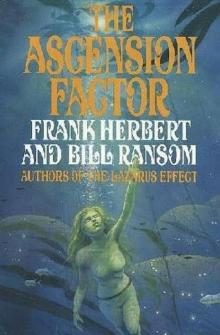 The Ascension Factor
The Ascension Factor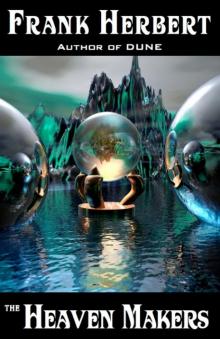 The Heaven Makers
The Heaven Makers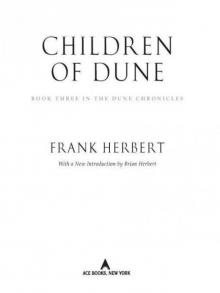 Children of Dune
Children of Dune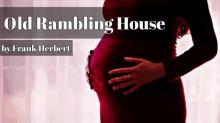 Old Rambling House
Old Rambling House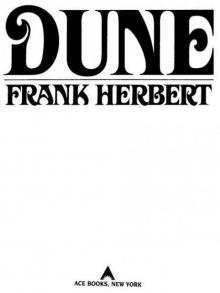 Dune
Dune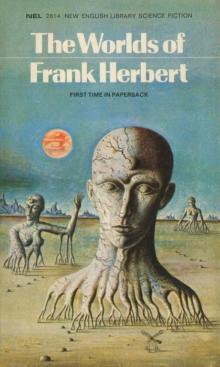 The Worlds of Frank Herbert
The Worlds of Frank Herbert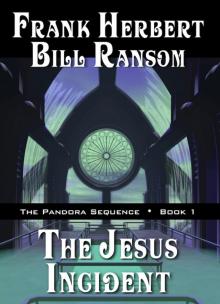 The Jesus Incident
The Jesus Incident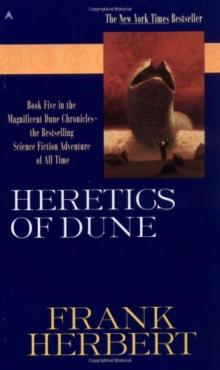 Heretics of Dune
Heretics of Dune Whipping Star
Whipping Star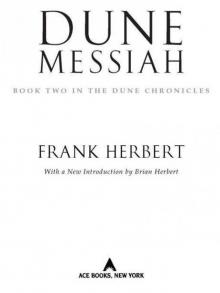 Dune Messiah
Dune Messiah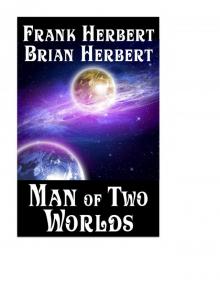 Man of Two Worlds
Man of Two Worlds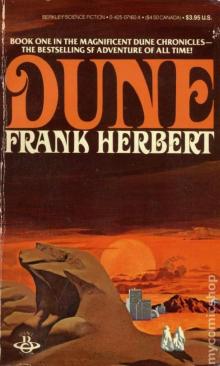 The Book of Frank Herbert
The Book of Frank Herbert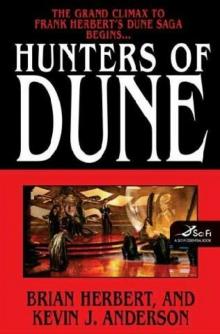 Hunters Of Dune
Hunters Of Dune The Tactful Saboteur
The Tactful Saboteur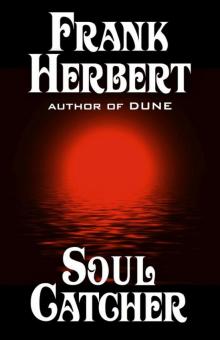 Soul Catcher
Soul Catcher God Emperor of Dune
God Emperor of Dune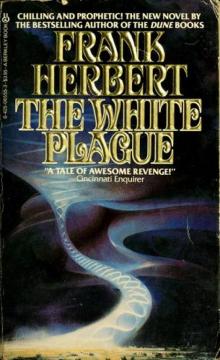 The White Plague
The White Plague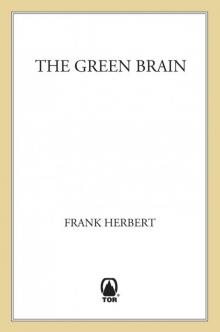 The Green Brain
The Green Brain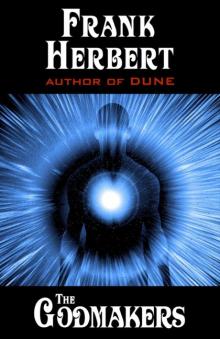 The Godmakers
The Godmakers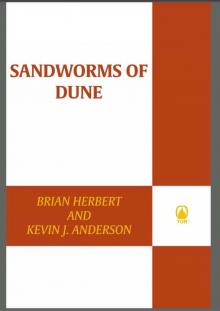 Sandworms of Dune
Sandworms of Dune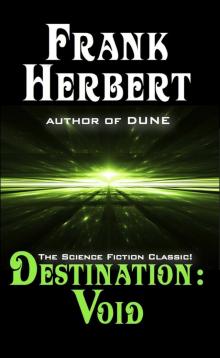 Destination Void
Destination Void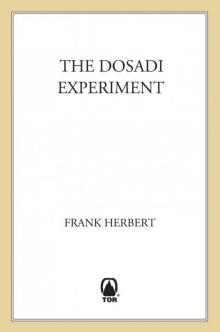 The Dosadi Experiment
The Dosadi Experiment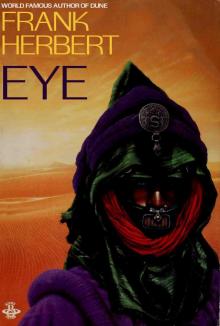 Eye
Eye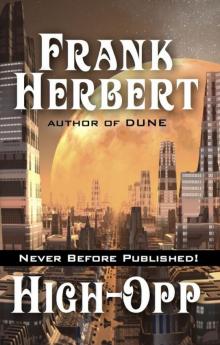 High-Opp
High-Opp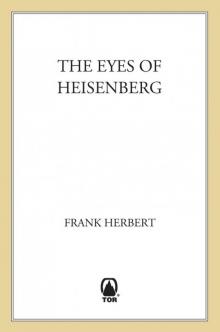 The Eyes of Heisenberg
The Eyes of Heisenberg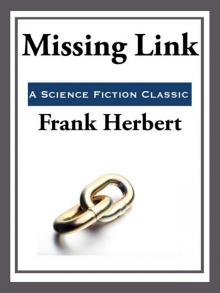 Missing Link
Missing Link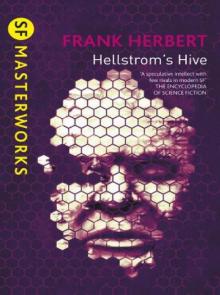 Hellstrom's Hive
Hellstrom's Hive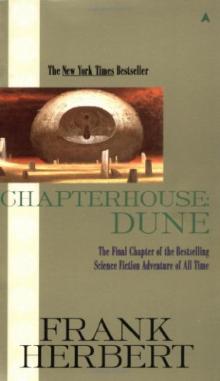 Chapterhouse: Dune
Chapterhouse: Dune The Santaroga Barrier
The Santaroga Barrier The Dragon in the Sea
The Dragon in the Sea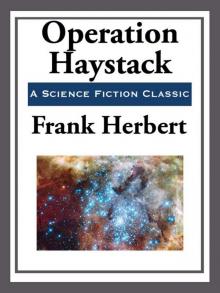 Operation Haystack
Operation Haystack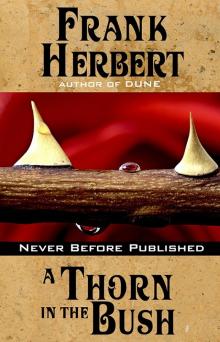 A Thorn in the Bush
A Thorn in the Bush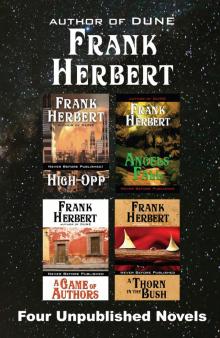 Four Unpublished Novels
Four Unpublished Novels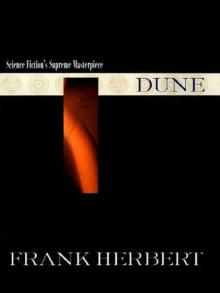 Dune dc-1
Dune dc-1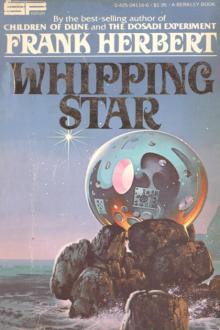 Jorj X. McKie 1 - Whipping Star
Jorj X. McKie 1 - Whipping Star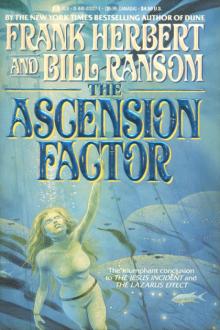 DV 4 - The Ascension Factor
DV 4 - The Ascension Factor Frank Herbert - Dune Book 4 - God Emperor Of Dune
Frank Herbert - Dune Book 4 - God Emperor Of Dune ChapterHouse: Dune dc-6
ChapterHouse: Dune dc-6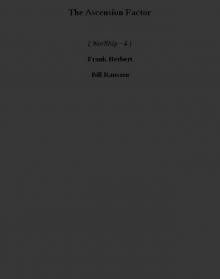 The Ascension Factor w-4
The Ascension Factor w-4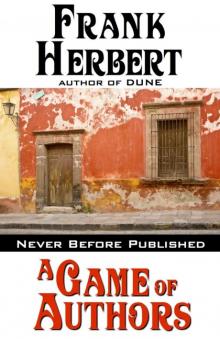 A Game of Authors
A Game of Authors Children of Dune dc-3
Children of Dune dc-3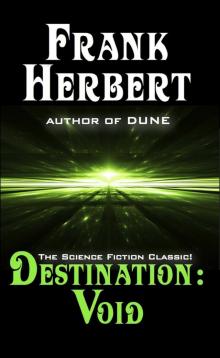 Destination: Void: Prequel to the Pandora Sequence
Destination: Void: Prequel to the Pandora Sequence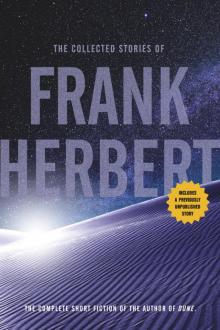 The Collected Stories of Frank Herbert
The Collected Stories of Frank Herbert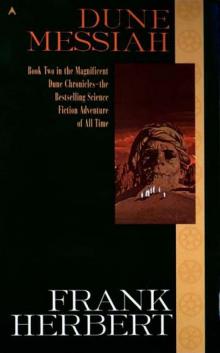 Dune Messiah dc-2
Dune Messiah dc-2 Frank Herbert - Dune Book 5 - Heretics of Dune
Frank Herbert - Dune Book 5 - Heretics of Dune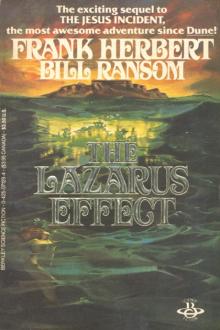 DV 3 - The Lazarus Effect
DV 3 - The Lazarus Effect The Jesus Incident w-2
The Jesus Incident w-2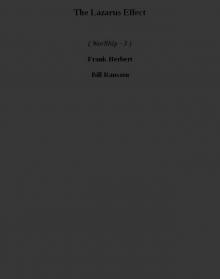 The Lazarus Effect w-3
The Lazarus Effect w-3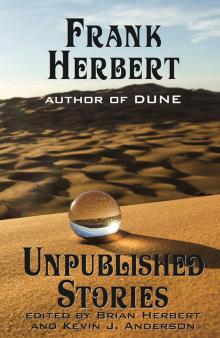 Frank Herbert
Frank Herbert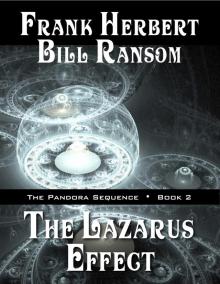 The Ascension Factor: Pandora Sequence
The Ascension Factor: Pandora Sequence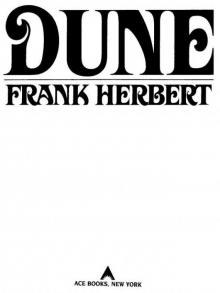 Dune (40th Anniversary Edition)
Dune (40th Anniversary Edition)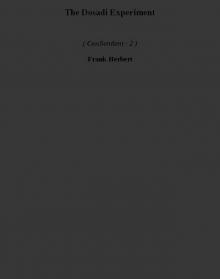 The Dosadi Experiment c-2
The Dosadi Experiment c-2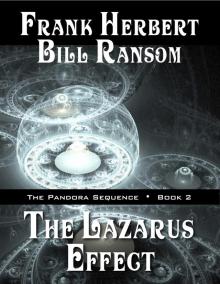 The Lazarus Effect
The Lazarus Effect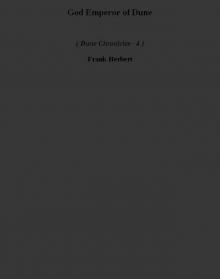 God Emperor of Dune dc-4
God Emperor of Dune dc-4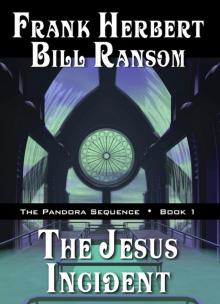 The Pandora Sequence: The Jesus Incident, the Lazarus Effect, the Ascension Factor
The Pandora Sequence: The Jesus Incident, the Lazarus Effect, the Ascension Factor The Green Brain (v4.0)
The Green Brain (v4.0) The Heaven Makers (v4.0)
The Heaven Makers (v4.0)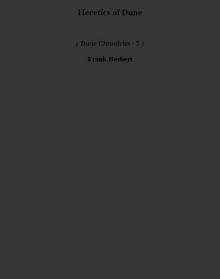 Heretics of Dune dc-5
Heretics of Dune dc-5